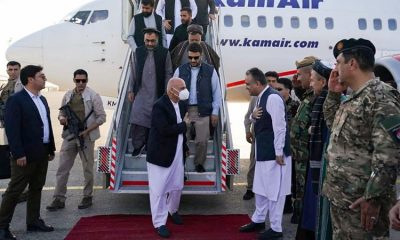Taliban take Ghazni City 10th Afghan provincial capital
The Taliban have taken Ghazni city, the 10th Afghan provincial capital to fall in a week and just 150 kilometres from Kabul.
Nasir Ahmad Faqiri, head of the provincial council said: “The Taliban took control of the key areas of the city — the governor’s office, the police headquarters and the prison.”
Fighting raged in Lashkar Gah, one of Afghanistan’s largest cities in the Taliban heartland of Helmand province, teetering toward being lost to the insurgents as suspected US airstrikes pounded the area, an official said.
President Ashraf Ghani is trying to rally a counteroffensive relying on his country’s special forces, the militias of warlords and American airpower ahead of the US and NATO withdrawal at the end of the month.
Afghan President Ashraf Ghani on Wednesday flew to the besieged northern city of Mazar-i-Sharif on Wednesday.
His aim was to rally his beleaguered forces as Taliban fighters, in a blitzkrieg took more than a quarter of the country’s provincial capitals in less than a week.
Ghani arrived in Mazar as the Taliban captured Faizabad overnight, making it the ninth city to be overrun since Friday.
He plans “to check the general security in the northern zone”, according to a statement released by the palace.
The loss of Mazar would be a catastrophic blow to the Kabul government and represent the complete collapse of its control over the north — long a bastion of anti-Taliban militias.
Meanwhile, the militants pressed on with their offensive that US intelligence believes could see them take over the capital, Kabul, within 90 days.
The speed of the Taliban advance — they have captured 10 provincial capitals in less than a week and are threatening to take at least three more — has sparked widespread recriminations of US President Joe Biden’s decision to withdraw US troops and leave the Afghan government to fight alone.
The Taliban control about two-thirds of Afghanistan, with the last of the US-led international forces set to leave by the end of the month, and their guerrilla army has waged war on multiple fronts, resulting in thousands of families fleeing the provinces in hope of finding safety in the capital, Kabul.
Government officials have appealed for pressure on Pakistan to stop Taliban reinforcements and supplies flowing over the border. Pakistan denies backing the Taliban.
The government has withdrawn from hard-to-defend rural districts to focus on holding population centres. In some places, government forces have given up without a fight.
In Geneva on Tuesday, UN human rights chief Michelle Bachelet said reports of violations that could amount to war crimes and crimes against humanity were emerging, including “deeply disturbing reports” of the summary execution of surrendering government troops.
Six EU member states warned the bloc’s executive against halting deportations of rejected Afghan asylum seekers arriving in Europe, fearing a possible replay of a 2015-16 crisis over the arrival of more than a million migrants, mainly from the Middle East.
Meanwhile, the Taliban on Wednesday denied targeting and killing civilians during an offensive against Afghan government troops, calling for an independent investigation and seeking to assure Afghans that “no home or family shall face any threat from our side.”
The Islamist militants issued a statement after the United Nations said more than 1,000 civilians had been killed in the past month and the International Committee of the Red Cross (ICRC) said that since Aug. 1 some 4,042 wounded people had been treated at 15 health facilities.
Taliban spokesperson, Suhail Shaheen, said in a statement that the group “has not targeted any civilians or their homes in any locality, rather the operations have been undertaken with great precision and caution.” He instead blamed Afghan government troops and foreign forces for any civilian deaths.
The United States refuted the Taliban’s denial of responsibility.
“There is, everywhere you look, compelling data points, evidence, imagery of the violence, the bloodshed, the potential atrocities that the Taliban are committing,” U.S. State Department spokesman Ned Price told reporters.
“We have seen it with our own eyes, from some of the footage that’s emerging.”
The Taliban proposed that a team made up of the United Nations, ICRC and other aid groups accompany their representatives “to conduct an impartial and independent investigation into the latest events.”
(AFP)


